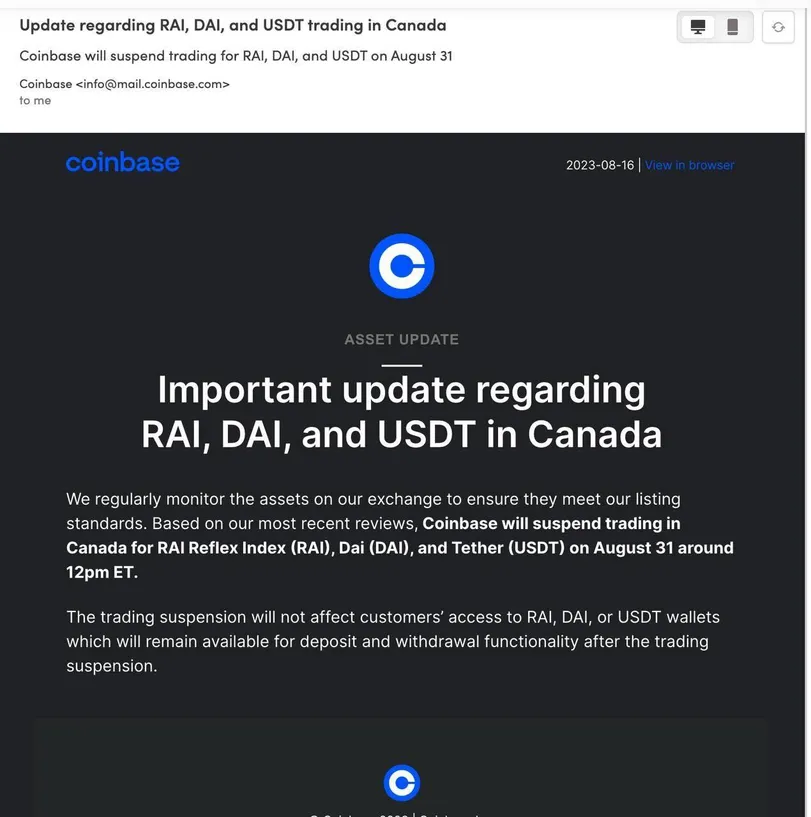Join Our Telegram channel to stay up to date on breaking news coverage
Just as Coinbase celebrated the expansion of its full range of services into Canada, it has hit a regulatory roadblock. Despite a recent announcement regarding its comprehensive entry into the Canadian market, Coinbase revealed on Monday that it is putting a pause on trading for three widely used stablecoins in the country, including the world’s largest stablecoin, Tether (USDT).
JUST IN:
Coinbase to suspend USDT trading for all users from Canada
— WhaleFUD (@WhaleFUD) August 17, 2023
As revealed in a customer email, Tether, along with RAI and DAI, no longer align with the listing criteria that Coinbase adheres to based on its most recent assessments. Even though trading for these stablecoins will be halted, Coinbase emphasized that Canadian customers will still have access to their RAI, DAI, and USDT wallets. Specifically, users can continue depositing and withdrawing from these wallets even after trading is suspended. This change is scheduled to be effective from August 31, around 12 p.m. ET.
Interestingly, this move by Coinbase seems to parallel a decision made by its competitor, Crypto.com. Earlier this year, Crypto.com discontinued its support for USDT in Canada, following directives from the Ontario Securities Commission (OSC).
About a month before that, the Canadian Securities Administrators (CSA) made a significant statement. They announced their perspective that stablecoins, including Tether and value-pegged assets like Wrapped Bitcoin (WBTC), are considered securities under their jurisdiction. The CSA emphasized that cryptocurrency exchanges are thus not permitted to allow Canadian users to trade or gain exposure to any crypto asset that qualifies as a security and/or derivative under this framework.
In this light, it seems plausible that Coinbase is responding to similar regulatory pressure in Canada, leading to its decision to suspend Tether support in this specific market. Notably, though, Coinbase’s own stablecoin, USDC, which holds the position as the second-largest asset of its kind in the market, will still be accessible to Canadian traders on the platform.
Stablecoins, the digital assets at the center of this decision, are crypto tokens generally tied to real-world assets like the U.S. dollar. Their design is aimed at preserving a constant value. These tokens play a crucial role in the global crypto ecosystem, serving as dollar stand-ins in regions where access to U.S. dollars is limited or completely unavailable. Decentralized finance (DeFi) traders often use them to strategically enter and exit positions on decentralized exchanges.
Tether, with its enormous market cap of over $82 billion, stands as the most prominent of these assets. It consistently sees more trading activity than even Bitcoin, the original cryptocurrency. However, Tether has faced sustained scrutiny over the years, with critics raising questions about whether it is indeed fully backed by reserves—an assertion that the company has yet to definitively substantiate through a complete audit.
As a contrasting move in the industry, Binance, the world’s leading crypto exchange by trading volume, disclosed in June that it planned to exit the Canadian market. This decision was attributed to new regulatory guidelines concerning stablecoins and investor restrictions.
Unfortunately, today we are announcing that Binance will be joining other prominent crypto businesses in proactively withdrawing from the Canadian marketplace.
We would like to thank those regulators who worked with us collaboratively to address the needs of Canadian users.…
— Binance (@binance) May 12, 2023
Regulation by Engagement vs Regulation by Enforcement
In a recent interview, Nana Murugesan, Coinbase’s Vice President of International Business Development, shared insights into the regulatory landscape, characterizing Canada as more receptive than the United States. Murugesan noted Canada’s approach as “regulation by engagement,” contrasting it with the U.S.’ “regulation by enforcement.”
Currently, Coinbase is navigating a lawsuit from the U.S. Securities and Exchange Commission (SEC). The SEC contends that Coinbase has listed multiple securities on its platform, a claim that Coinbase contests based on its interpretation of the law.
Related News
- New Upcoming Coinbase Listings in 2023
- Tether (USDT) Price
- Coinbase CEO Says Mobile App’s User Experience ‘Broken,’ Promises Rapid Fix
- 15 Best DeFi Coins to Buy in 2023 – Decentralized Finance Tokens
Most Searched Crypto Launch - Pepe Unchained
- Layer 2 Meme Coin Ecosystem
- Featured in Cointelegraph
- SolidProof & Coinsult Audited
- Staking Rewards - pepeunchained.com
- $10+ Million Raised at ICO - Ends Soon
Join Our Telegram channel to stay up to date on breaking news coverage



